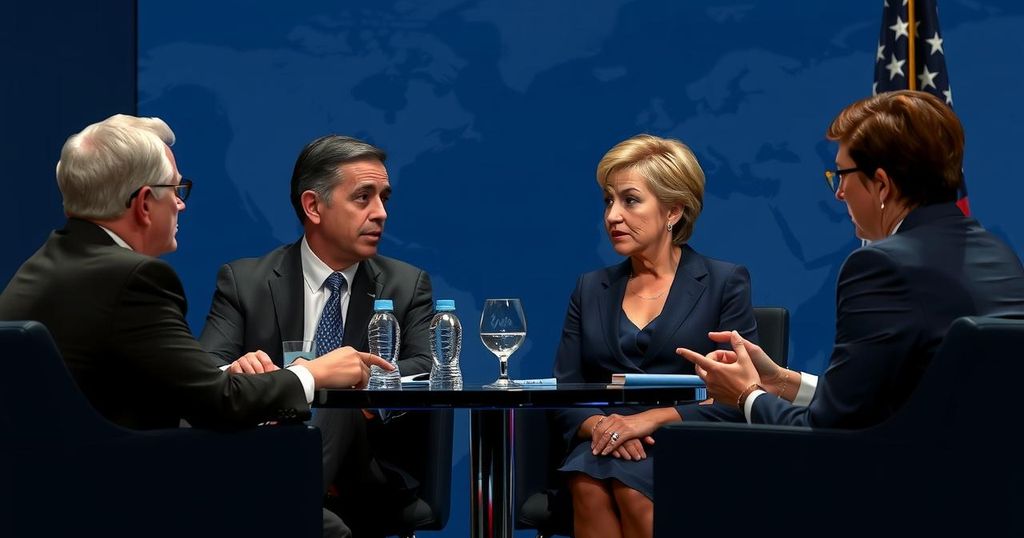US Presidential Candidates Embrace Hardline Immigration Policies Reflecting Global Trends

The political climate in the United States regarding immigration is shifting rightward, with presidential candidates Donald Trump and Kamala Harris both adopting increasingly hardline stances. Trump’s rhetoric suggests a need for drastic immigration enforcement measures, while Harris has pledged to reinforce border security. This trend reflects a broader global phenomenon as mainstream parties across various nations respond to rising far-right populism by hardening their immigration policies, raising complex questions about asylum rights and the treatment of immigrants.
In recent discourse surrounding United States presidential candidates, former President Donald Trump has reignited stark rhetoric concerning immigration, advocating a perceived defensive stance against an alleged influx of undocumented immigrants. At a recent rally in Aurora, Colorado, Trump proclaimed intentions for “the largest deportation operation in the history of the United States” and promised to “close the border” to combat what he describes as an invasion. This narrative reflects a broader, international momentum toward restrictive immigration policies, with prominent figures across the political spectrum adopting increasingly hardline positions. With the impending presidential race intensifying between Trump and current Vice President Kamala Harris, Harris has also shifted her stance toward stricter immigration measures, a move anticipated by observers as indicative of a rightward collective movement among both liberal and conservative parties. Her campaign emphasizes strengthening border enforcement, suggesting hiring thousands of additional border agents, alongside her past support for stringent border control legislation. This development is emblematic of a more considerable global trend where immigration has become a polarizing issue, influencing political discourse not only in the United States but also in countries such as France, Germany, and the United Kingdom. For example, the recent success of the nativist Reform UK Party and the anti-immigrant Alternative for Germany exemplifies a rising tide against mainstream humanitarian immigration policies, reflecting broader societal fears regarding migration. As parties on the right and left scramble to secure electoral support, figures such as Macron in France have co-opted restrictive measures typically associated with far-right ideologies. Harris’s approach thus far appears defensive, aiming to mitigate accusations of leniency towards unregulated immigration, even though Democrats are also proposing pathways for legal migration. Amidst these developments, immigration discussions continue to shape the political landscape, compelling candidates to navigate a complex array of public sentiments regarding migration, humanitarian rights, and national security, as seen in the recent polling that identifies immigration as a significant concern for voters this election cycle.
The article discusses the evolving landscape of immigration politics as it relates to the upcoming presidential election in the United States, underscoring a notable shift toward harsher immigration rhetoric and policies among mainstream political figures. The Democratic and Republican platforms, represented by Kamala Harris and Donald Trump respectively, demonstrate a significant rightward shift that reflects global trends surrounding migration issues. This developing narrative is not only significant on a national level but is also echoed internationally, whereby conservative and far-right parties gain traction through anti-immigration campaigns, presenting immigration as a pressing concern amid economic and social anxieties. By contextualizing immigration within the framework of political strategy, the narrative elucidates the intertwined relationship between public sentiment, political maneuvering, and immigration law.
In conclusion, the discourse surrounding immigration has shifted markedly among US presidential candidates, particularly between Donald Trump and Kamala Harris, reflecting broader international patterns favoring restrictive immigration measures. As both candidates adopt increasingly stringent policies, it becomes evident that fears regarding immigration are being manipulated within the political arena, reshaping longstanding dialogue about humanitarian obligations and societal benefits of migration. The ongoing transformation of immigration narratives merits close examination, as it encapsulates broader dilemmas regarding national identity, economic concerns, and humanitarian rights. The political exploitation of these fears illustrates a critical moment in the intersection of immigration policy and electoral strategy, with significant implications for the future of both domestic and international immigration protocols.
Original Source: www.aljazeera.com






